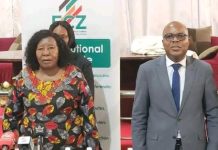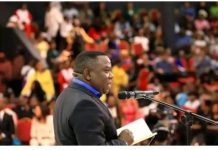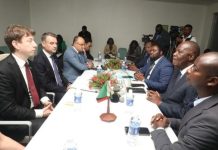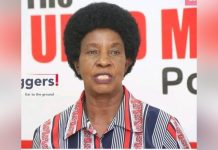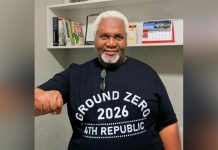
Africa-Press – Zambia. EDITOR’S CHOICE- Presidency in Retreat: The Truth Behind the Deferring of Bill No. 7 by President Hakainde Hichilema
By Thandiwe Ketiš Ngoma
On 26 June 2025, the nation was hit by a rude shock. A press statement from State House announced that President Hakainde Hichilema had “guided” the Minister of Justice to defer Constitution Amendment Bill No. 7 of 2025 to allow for broader national consultation.
Let us set the record straight. The claim that this deferral was guided by democratic instincts or a desire for inclusive dialogue is not only misleading; it is a calculated distortion of the truth. It was not leadership. It was not humility. It was a political retreat. A retreat from legal defeat. A retreat from constitutional exposure. A retreat from the people.
A Last-Minute Save from Impeachment
This decision was not driven by principle. It was driven by panic. The President and his inner circle had already received word that the Constitutional Court was preparing to strike down Bill No. 7 for violating key provisions of Zambia’s supreme law. Had the judgment been handed down, it would not only have nullified the bill but would also likely have ignited a national debate on presidential misconduct, which constitutes grounds for impeachment.
Instead, a convenient spin was hastily crafted. “Consultation” became the buzzword used to disguise what was, in truth, a constitutional capitulation.
A Pattern of Political Abuse
We have seen this pattern before. Just as President Hichilema used his political surrogate Michelo Chizombe to file a petition to disqualify the late former President Edgar Chagwa Lungu from the 2026 elections—a case where insiders suspiciously knew the Constitutional Court’s judgment days before its public delivery on 10 December 2024—we again witness the same choreography. Weaponize the judiciary, pre-empt the backlash, and control the narrative.
But this time, the stakes were higher. This time, the scheme targeted the Constitution itself.
Bill No. 7: Reform or Power Grab?
Bill No. 7 was not designed to strengthen democracy. It was a Trojan horse, carefully disguised as reform, while containing provisions that would have
expanded presidential powers, weakening institutional checks and balances
interfered with electoral timelines and processes, giving the Executive influence over the Electoral Commission of Zambia (ECZ)
reduced parliamentary oversight, centralizing decision-making in the Presidency
undermined judicial independence by restructuring the appointment processes of constitutional judges
All this was packaged under a vague promise of modernizing the Constitution. Yet the bill was drafted in secrecy, presented without genuine public consultation, and rushed through Parliament with scant regard for constitutional procedure.
The Legal Fightback
It was in this moment of constitutional peril that Hon. Munir Zulu, then an Independent MP for Lumezi, alongside his legal counterpart Celestine Mukandila, stepped forward. With courage and clarity, they filed a constitutional petition challenging the legality of Bill No. 7.
They did not act out of political self-interest but out of patriotic duty. Their case was anchored in the rule of law. It was methodical. It was principled. It was brave.
Judiciary in Captivity
The reality is as painful as it is undeniable. Zambia’s judiciary is no longer fully independent. Under President Hichilema’s administration, the courts have become entangled in politics. Judges are reassigned, intimidated, or strategically promoted based on loyalty. The Constitutional Court, once the final shield for the people’s rights, now delivers judgments that increasingly echo the voice of the Executive.
When the President knows the outcomes of court cases before the judges speak, we are no longer in a democracy. We are in a system that mimics democracy but is ruled by executive control, an elected autocracy.
Yet in this instance, the scheme faltered. Some judges, still faithful to their oath, resisted the pressure. The result was a four-to-three split vote. The four who upheld the Constitution prepared to deliver a ruling against Bill No. 7. The other three, who supported the bill, informed the President in advance, as they usually did, and explained the consequences the judgment would have on his presidency.
The President blinked. In a last-minute maneuver, the bill was deferred to avoid a judgment that could have shaken the very foundations of his administration.
The People Are Awake
Zambians have had enough. Enough of power plays disguised as reform. Enough of constitutional mutilation for political convenience. Enough of selective prosecution. Enough of judicial puppetry.
What we demand is simple:
honest leadership
an independent judiciary
protection of constitutional order
a government that respects, not reinterprets, the law
The deferring of Bill No. 7 is not the end. It is the beginning of a new phase in Zambia’s democratic awakening. Civil society is rising. The legal fraternity is alert. Youth across the country, who will inherit the future shaped by this Constitution, are watching, organizing, and remembering.
A Warning, Not Just a Critique
Let this moment serve not just as a critique but as a warning.
Mr. President, you were not elected to rewrite the Constitution to suit your personal or political ends. You were elected to protect it. You took an oath not to your party, not to your advisors, but to the people of Zambia and to the Constitution itself.
If you attempt again to undermine it, know this. The people will resist. The courts, if they remain true, will resist. The Constitution will resist.
The Truth Cannot Be Deferred
The truth is now out. The judiciary has been compromised. The Constitution has been under siege. And the people? They are no longer asleep.
Mr. President, the people are watching. And this time, they will not look away.
For More News And Analysis About Zambia Follow Africa-Press


